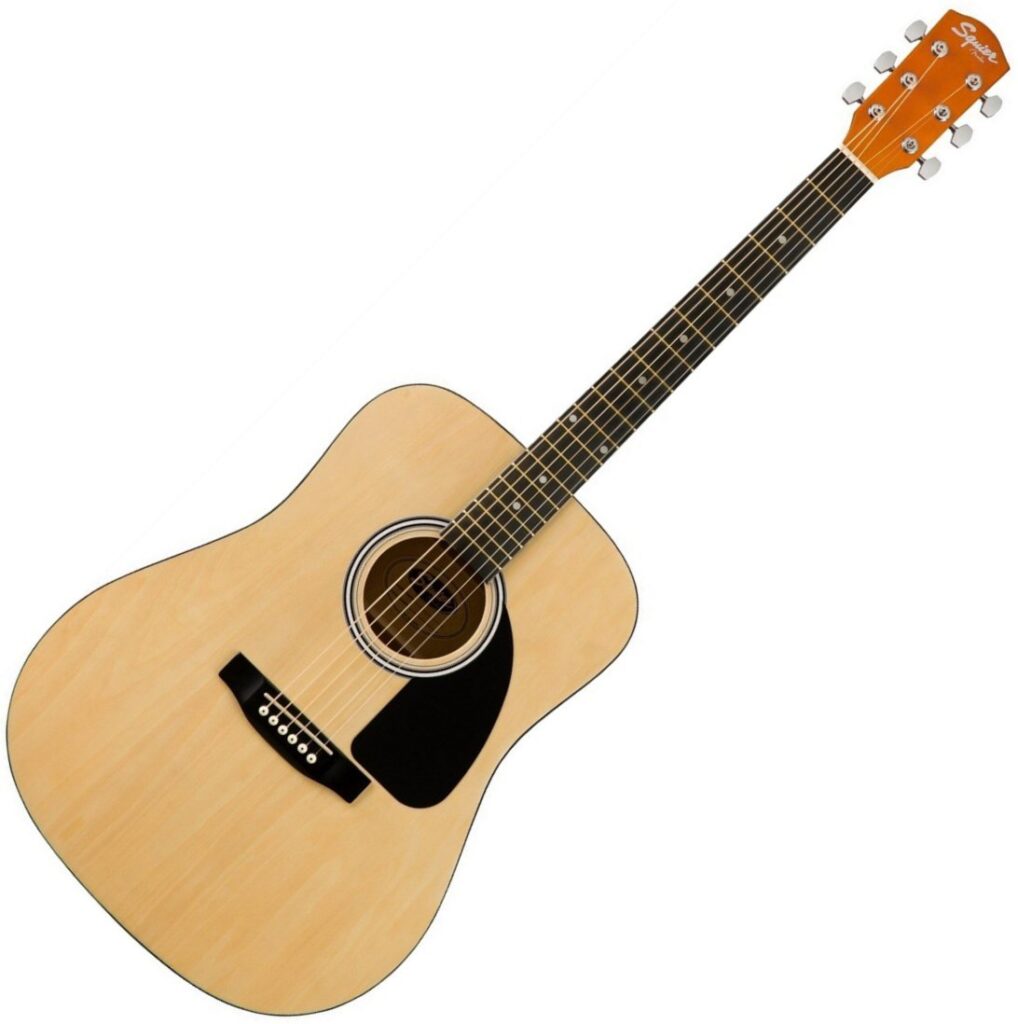Squier by Fender is a subsidiary of guitar giant Fender. With almost two hundred years of experience, it’s safe to assume they know how to make a guitar. That being said, I certainly wasn’t expecting this level of quality at the SA-150’s price point. For its price range, the finish on the body was flawless – and there were no apparent blemishes or imperfections anywhere on the matte black paint job. The tone and volume knobs felt solid and moved smoothly without any hint of scratchiness, and all three tuners (one for fine-tuning) seemed well built enough to last through your first year as a fledgling guitarist.
The build quality is where the SA-150 really shines; for a guitar in this price range, more often than not you’ll find yourself forgiving its shortcomings purely because of how good it looks and feels. But don’t be fooled – while some sacrifices obviously had to be made in order to get this instrument within reach of beginners, every aspect of the SA-150’s construction appears solid enough to last through several years’ worth of gigging or practice time. On an unrelated note, I was pleasantly surprised at how lightweight the SA-150 is – most entry-level acoustics are dreadfully heavy but that isn’t an issue for this beauty.
This guitar is worth every penny of its price tag, but I’d still recommend putting in a little extra money if you can swing it–you’ll thank yourself later on when the time comes to upgrade. But before I go too far into my love for this instrument, let’s get down into the nitty-gritty details that are sure to help any potential purchasers make an informed decision.
The Squier by Fender SA-150 Acoustic Guitar
Specifications Body Type: Dreadnought Cutaway: No Top Material: Spruce Back Material: Sapele sides and back Bracing Pattern: Quartersawn Scalloped X Body Depth: 3 7/8″ (98.4 mm) Body Length: 19 1/2″ (495 mm) Body Width: 15 1/2″ (393 mm) Headstock Size: Standard Bridge Span: 20-7/8″ (527mm) Tuning Machines: Chrome die-cast sealed Gear Ratio: 14:1 Fingerboard Material : Rosewood Neck Finish : Gloss polyurethane neck Back Shape : SlimTaper D Neck Binding : No Number of Frets Total : 20 Number of Frets – 12 string : 6 Nut Width : 1.69 “(43 mm), bone Pickguard Material : Tortoise shell Electronics Active or passive pickups No
Pros and Cons of the Squier by Fender SA-150
Pros: The first thing I noticed about this guitar is how comfortable it was to play. It’s no Les Paul Custom but the neck is relatively slim and easy to navigate. As with some other aspects of this instrument, that may be due in some part to the fact that the body isn’t quite as large as most dreadnoughts; keeping in mind that some people like their sound, this can also yield a more defined tone than many entry level acoustics which do little more than muffle your strumming hand. While I’m not sure if it’s true or just coincidence, the fretboard felt pretty level all throughout – something you’re unlikely to see on a guitar at any price point. All things considered, the craftsmanship and attention to detail visible on every inch of the SA-150’s body is more than impressive for a guitar in this price range.
Cons: As much as I love the look and feel of this guitar, there are some notable drawbacks – most notably that mic placement is difficult due to not having cutaways. The sound quality was also somewhat disappointing; it has its good moments but there’s no denying that you’re going to need an amplifier if you want anything beyond quiet practice sessions. Additionally, while I’m impressed by how well made this instrument appears to be, that doesn’t mean it won’t require servicing or maintenance eventually. And again retuning when recording could be a pain when your axe starts slipping.
The Verdict: While the Squier by Fender SA-150 Acoustic Guitar isn’t perfect, many of its flaws can be fixed by purchasing a decent amp and adding on a couple of accessories. It may not be what you’re looking for if you want to play in larger venues – and it certainly won’t work for beginners interested in playing electric guitar – but this could easily become your go-to ax when hanging out with friends or practicing at home.




